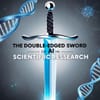Artificial intelligence (AI) is revolutionizing scientific research by analyzing vast amounts of data, identifying patterns, and generating hypotheses at unprecedented speeds. In fields like genomics, climate science, and physics, AI is enabling discoveries that wouldn't have been possible otherwise. By freeing researchers from tedious tasks, AI allows them to focus on higher-level thinking and accelerate the discovery process.
However, the increasing reliance on AI in research also raises concerns. When AI assists with hypothesis generation and experimental design, the line between human insight and algorithmic suggestion can become blurred. Researchers might trust AI outputs without fully understanding the underlying methods, which can lead to a loss of human insight and critical thinking. Moreover, AI's pattern recognition capabilities, while powerful, don't necessarily imply causal understanding.
The pressure to publish research quickly can also be amplified by AI tools that speed up the research process. This can lead to a focus on quantity over quality in publications, potentially undermining the integrity of scientific research. To mitigate these risks, it's essential to establish clear guidelines and rules for AI use in research, ensuring that scientists understand the limitations of AI and maintain intellectual humility.
By combining human ingenuity with AI's analytical capabilities, researchers can unlock new breakthroughs and accelerate discovery. However, it's crucial to strike a balance between harnessing AI's potential and preserving the critical thinking and nuance that define human scientific inquiry. By doing so, we can ensure that AI enhances the scientific process without compromising its integrity.


